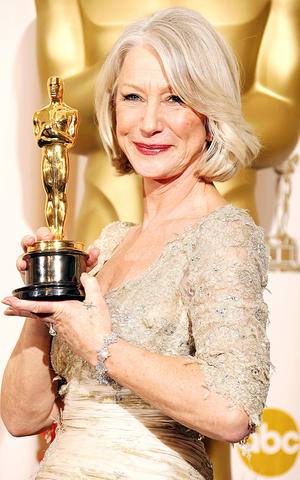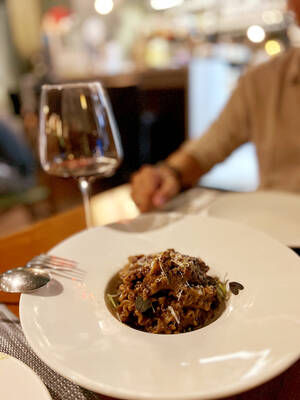Friends and family of nominated film stars are often nervous on the eve of a big cinema awards ceremony. For dog owner Liz Smith, the run-up to the first ever Fido Awards at the London Film Festival on 28 Oct. will be tense indeed.
Smith's five corgis - Anna, Poppy, Megan, Alice and Oliver - are all featured prominently in the Oscar-winning film The Queen, and are now joint contenders in the Historical Hound category at the inaugural awards event for dog performances on screen. If the dogs succeed in their bid for critical recognition, director Stephen Frears will be able to add a pack of four-legged actors to the long list of those who have already been saluted with Baftas, Golden Globes and Oscars for their part in his intimate portrait of the reaction of the British monarchy to the death of Princess Diana.
But competition for the Fidos, even in their first year, is ferocious. Among the other frontrunners in the historical category is the collie mix who appears in Control, Anton Corbijn's film about the life and early death of Ian Curtis, lead singer of the 1980s Manchester band Joy Division. The dog, owned by Samantha Morton's character in the film, appears at a crucial moment in the singer's descent into the world of drugs. Other categories to be judged by a panel of leading figures in the industry, including the veteran film critic Derek Malcolm, are Comedy Canine and Blockbuster Bowser. Dogs up for these awards include the animals featured in Nancy Meyers' The Holiday, Mike White's Year of the Dog and Michael Davis's Shoot'em Up.

PHOTO: AP
Helen Mirren, who played Elizabeth II in Frears' film, had to share the screen with the dogs in many of her key scenes. It proved intensive work with which she remains very pleased. "The corgis were not film-trained. I had to work with them to follow me," said Mirren last week." But I am good with dogs and know how to get them to do what I want. I loved those Corgis because they were funny. I can understand why the Queen has them. Forget winning an Oscar, I'd be more proud of an award for dog handling."
Smith's talented pets, nine-year-old Anna, seven-year-old Poppy and her three-year-old puppies, were spotted at an obedience competition by an animal consultant out scouting for suitable dogs for the film. It was the corgis' first experience of the entertainment industry but while shooting The Queen, Smith, a retired outside caterer from Little Blakenham near Ipswich, became known as Corgi Liz on the set. She accepted a booking for her dogs in the prime-time BBC six-part drama, The Amazing Mrs Pritchard, in which they co-starred with Jane Horrocks.
The Fidos follow in the pawprints of the canine event at the Cannes Film Festival known as the Palme Dog, now in its seventh year. Both events are masterminded by Toby Rose, who said this weekend he was very pleased to have broken into another major European film festival. The Fidos, he argues, are an antidote to the pomposity of the film industry and provide a different take on the year's cinematic hits. 'When you start looking out for the dogs it is incredible what key performers they often are and what key moments they are often involved in,' said Rose.
The BFI festival opens on Wednesday and its creative director, Sandra Hebron, said she believes the ceremony will become a fixture. "No seasoned festival-goer can have failed to notice the splash that the Palme Dog award has made at the Cannes Film Festival, so it is wonderful news that the winners of the sister ceremony, the Fidos, will become part of London Film Festival 2007."

Last week gave us the droll little comedy of People’s Republic of China’s (PRC) consul general in Osaka posting a threat on X in response to Japanese Prime Minister Sanae Takaichi saying to the Diet that a Chinese attack on Taiwan may be an “existential threat” to Japan. That would allow Japanese Self Defence Forces to respond militarily. The PRC representative then said that if a “filthy neck sticks itself in uninvited, we will cut it off without a moment’s hesitation. Are you prepared for that?” This was widely, and probably deliberately, construed as a threat to behead Takaichi, though it

Nov. 17 to Nov. 23 When Kanori Ino surveyed Taipei’s Indigenous settlements in 1896, he found a culture that was fading. Although there was still a “clear line of distinction” between the Ketagalan people and the neighboring Han settlers that had been arriving over the previous 200 years, the former had largely adopted the customs and language of the latter. “Fortunately, some elders still remember their past customs and language. But if we do not hurry and record them now, future researchers will have nothing left but to weep amid the ruins of Indigenous settlements,” he wrote in the Journal of

Even after years in business, weekend tables here can be booked out a month in advance. The price point far exceeds its competitors. Granted, expectations are soaringly high, but something here failed to hit the high notes. There are a few telltale signs that a restaurant relies solely on outstanding food to create the experience, no gimmicks or distractions needed. La Mole is such a restaurant. The atmosphere is food-forward, with an open kitchen center stage. Our tables are simple; no candles, no dim lighting, no ambient music. The menu is brief, and our waiter directs most

If China attacks, will Taiwanese be willing to fight? Analysts of certain types obsess over questions like this, especially military analysts and those with an ax to grind as to whether Taiwan is worth defending, or should be cut loose to appease Beijing. Fellow columnist Michael Turton in “Notes from Central Taiwan: Willing to fight for the homeland” (Nov. 6, page 12) provides a superb analysis of this topic, how it is used and manipulated to political ends and what the underlying data shows. The problem is that most analysis is centered around polling data, which as Turton observes, “many of these